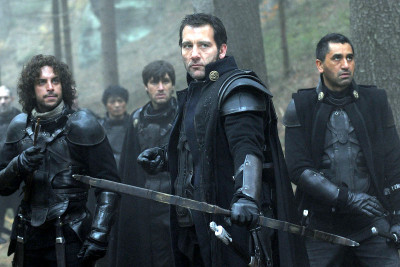Last Knights is Kaz I Kiriya’s third film – his first in English – following the cult classic/live-action version of manga/anime series Casshern, and martial arts oddity Goemon. It is a tale of honor, love and loyalty set in a medieval culture reminiscent of Kiriya’s native Japan, but truly diverse – citizens of all races live and work together(even the lords and warriors are diverse).
Clive Owen’s Commander Raiden is the chief retainer of Lord Bartok (Morgan Freeman) and, when his master’s life is forfeit over a refusal to pay an important court official a bribe, it falls to him to take control of the clan and restore his master’s honor.
I cannot recall exactly how many movies I’ve seen that follow the basic plotline of Last Knights, but none have been quite as surreal. That surreality comes from the matter of fact way in which the diversity of the world is portrayed, and in the equally matter of fact way in which weapons and fighting styles seem to encompass both eastern and western elements.
It is also a bit different to see castles that reflect western styles on the exterior but more eastern influences inside. Even the score, by Martin Tillman and Satnam Ramgotra, is balanced between eastern and western styles – to an intriguingly harmonious effect that definitely adds atmosphere to the proceedings.
The code by which the kingdom’s warriors live is not unique – valuing honor, good conduct and loyalty – but to see it reflected by even the villain’s chief retainer is more than a little unusual.
The main players in Last Knights are Raiden, Ito (Tsuyoshi Ihara) – the aforementioned villain’s chief retainer, and Geza Mott (Aksel Hennie), the Emperor’s (Peyman Moaadi) number two. Freeman’s Bartok is gone by the time the film is fifteen minutes old – after providing the main thrust of the plot for the remainder of the film (and, not coincidentally, providing us with a look at how honor should be seen in this culture).
One of the best things about Last Knights is the way in which Geza Mott (always referred to by his full name in the movie) becomes paranoid about Raiden seeking vengeance – going to extremes in bolstering security (drafting half of one lord’s retainers, building a vast iron gate to his residence within the already well protected castle). Hennie is perfectly weasely as the villain who is more used to manipulating and extorting others than anything else.
Owen is the stalwart hero/face of vengeance – though he does make it hard for us to see that through the film’s second act. One of Owen’s greatest abilities is to play the tough, honorable man who is just a little vulnerable and that’s something he does really well here.
Last Knights also has an extremely good supporting cast – from Cliff Curtis’ Lt. Cortez to Sung-kee Ahn’s Lord Auguste (whose daughter is married to the abusive – of course – Geza Mott), to Ayelet Zurer (Raiden’s wife, Naomi) and Shoreh Agdashloo (Bartok’s wife, Maria) and the men of Raiden’s command.
The best thing about Last Knights is that it delivers what we’re expecting, but in unexpected ways. In a way, the last two-thirds of the movie set up an almost Mission: Impossible: Gets Medieval kind of scenario that is a lot of fun to watch play out.
As a fan of Casshern – both the anime and the live-action movie – I have to say that I really enjoyed Last Knights. The script, by Michael Konyves and Dove Sussman, is smarter than I was expecting and Kiriya handles both emotional and expositional scenes as well as he does action sequences.
For a low budget period piece (even if that period is purely fictional), Last Knights looks better than a lot of blockbusters and is as much (if not more) fun. It’s just a shame that it’s so many years between Kiriya’s projects (Casshern, 2004; Goemon 2009).
Final Grade: B+
